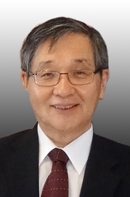President’s Message 2016
History and Academic Contribution of Japanese Society for Hygiene
The Japanese Society for Hygiene (JSH) was established by members of the Japanese Association of Medical Sciences in 1902 as a professional body dealing with hygiene, bacteriology and infectious diseases. In 1929, the JSH became independent of the other two specialties within the Japanese Association of Medical Sciences. With a 113-year history since its origins in 1902, the JSH is one of the oldest academic societies in Japan.
The JSH aims to promote human health through integration of diverse factors associated with human life and the social and natural environment. We are very proud of the fact that our society has contributed to eliminating health problems, not just in Japan but around the world. Examples of these are beriberi disease and four major environmental diseases: Minamata disease (methylmercury poisoning); Itai-itai disease (cadmium poisoning); Yokkaichi asthma; and Toroku arsenic disease). We have undertaken various efforts in this area, ranging from basic research to social policy making. Making contributions in this way is a long tradition of our society, and it is still maintained today. Our members have made significant achievements in preventive medicine, and they have uncovered new findings in environmental health, thereby stimulating the development of young researchers in social medicine.
Current Situation of the JSH
We have published Nihon Eiseigaku Zasshi in Japanese since 1946, and it is indexed by PubMed. Because it is important that our society’s scientific journal should reach a global audience, we began publication of Environmental Health and Preventive Medicine—an international English-language publication—in 1996. In 2013, Environmental Health and Preventive Medicine was indexed by PubMed, and this year it will receive an impact factor.
In this May in 2016, the 86th annual meeting of the JSH will be held in Asahikawa in Hokkaido. At those annual meetings, breakthrough findings in topics related to preventive medicine and environmental health have been reported. Those events also have allowed researchers to exchange scientific ideas in a friendly environment.
However, we have to note that there has been a decrease in the number of JSH members as a result of restructure and reform at medical schools in the field of social medicine. Although the number of society members has now stabilized, we can not recover the number of member, 2000. At present, we have few women and young members, and the proportion of older members is increasing.
New Directions for JSH
If we look back at the history of the JSH, it is evident that the society has been strongly influenced by nineteenth-century German social medicine. The JSH emphasizes experimental medicine and mechanism-based prevention, expecting a contribution to administrative bodies, such as national and local government. That was the case with the nineteenth-century German system. As expressed by the French philosopher Michel Foucault (1926-1984), British social medicine (which Foucault considered more successful than its German counterpart) developed differently from social medicine in Germany because it addressed personal development i.e., professionalism. Professionalism was able to thrive in what Foucault termed a “private space.” That “space” stimulated pursuit of personal professional development.
In the twenty-first century, I believe we need to introduce a paradigm change into our society—one that places a greater emphasis on personal career development than making an administrative contribution. To promote professionalism, it is necessary for us at the JSH to work hard toward establishing a new certification body for expertise in social medicine. We are working in close collaboration with other academic societies, including the Japanese Society of Public Health and Japanese Society of Occupational Health. Such a certification body would endorse expertise in the entire field of social medicine.
There are, however, as well many health issues related to the global environment that need to be addressed, for example, existing and emerging infectious diseases and problems with particulates, such as PM2.5. Furthermore, because social medicine has its own scientific value, we need to be able to publish our achievements. With these global trends in mind, we intend to make Environmental Health and Preventive Medicine into an open access journal in 2017. In this way, our journal will become more accessible to the world at large.
The biggest mission for scientific society today is promoting the young generation of academics. To fulfil this mission, we need to tackle such issues as equal opportunities for gender and generations in the society.
With these new directions and our long heritage, JSH can transform into a global scientific society—one that enhances the personal development of each member and plays a key role in social medicine. The board of trustees will work hard so that our members can achieve that goal.
AKIO KOIZUMI
President of the Japanese Society for Hygiene
Professor, Kyoto University Graduate School of Medicine

